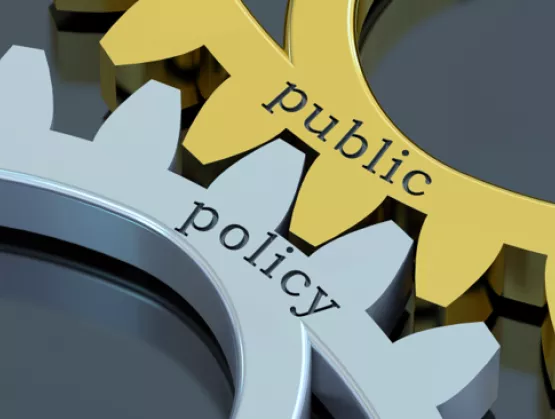
SEMI Europe’s advocacy team is a key force in influencing public policy in areas of strategic importance to the region’s semiconductor industry, making SEMICON Europa the ideal venue for addressing industry-shaping trends and enacting change on policy issues.
At SEMICON Europa 2019, we hosted public policy sessions on four key policy issues: talent, circular economy, trade, and research and development (R&D)
Building the electronics talent pipeline
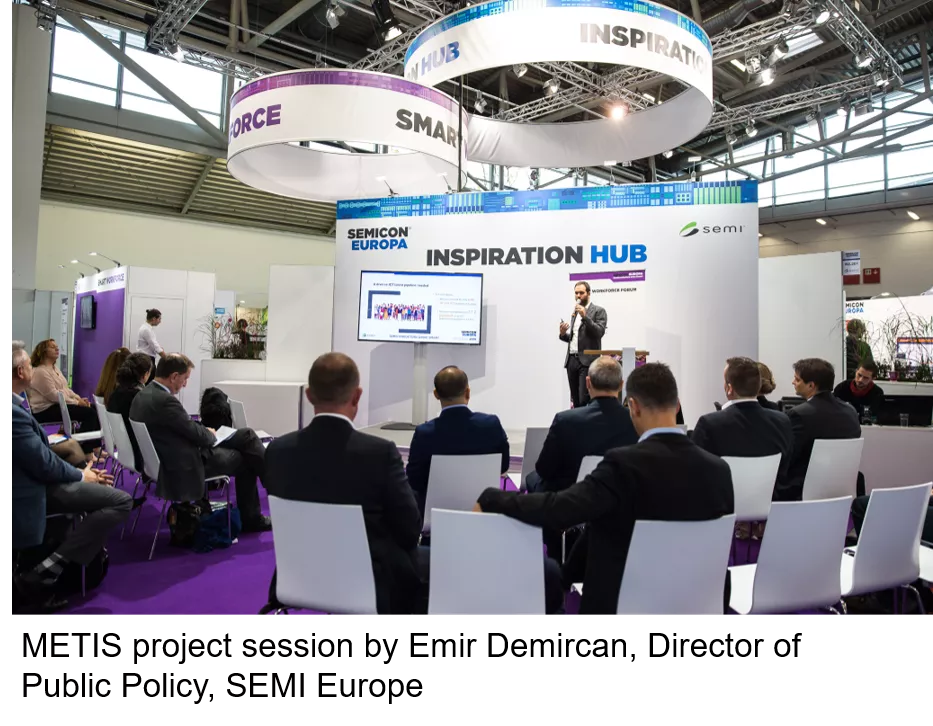 SEMI and 19 partners from 14 countries launched the METIS (Microelectronics Training, Industry and Skills) project to fill the skills gap by tightening collaboration between the microelectronics industry and education providers. SEMI briefed stakeholders participating in SEMICON Europa Smart Workforce sessions on METIS and invited them to join METIS focus groups that will be launched in 2020. Focus group topics will include artificial intelligence (AI), smart wearables and cryptography.
SEMI and 19 partners from 14 countries launched the METIS (Microelectronics Training, Industry and Skills) project to fill the skills gap by tightening collaboration between the microelectronics industry and education providers. SEMI briefed stakeholders participating in SEMICON Europa Smart Workforce sessions on METIS and invited them to join METIS focus groups that will be launched in 2020. Focus group topics will include artificial intelligence (AI), smart wearables and cryptography.
A Sector Skills Alliance co-funded by the Erasmus+ Program, METIS is designed to overcome the skills shortage in the electronic components and systems value chain. Under METIS, SEMI and the partner organizations will establish a Microelectronics Observatory and Skills Council consisting of representatives from industry, academia, NGOs, think tanks and government.
The consortium will develop a New Skills Strategy for the microelectronics industry in Europe with a focus on raising occupational profiles and skills critical to the future of the sector.
Advancing the circular economy in electronics manufacturing
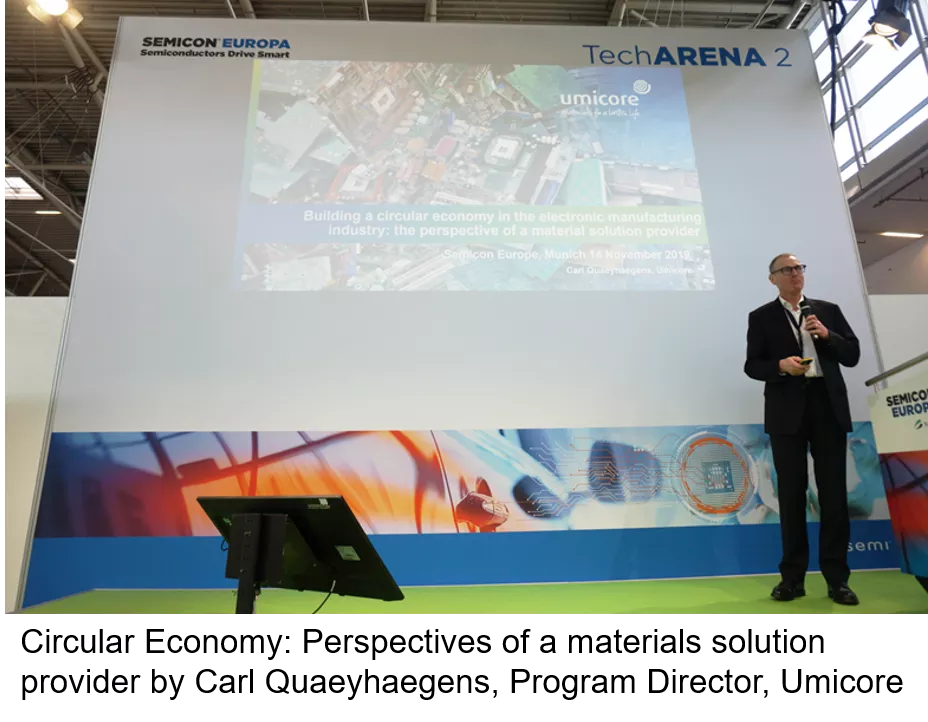 New European Commission president Ursula von der Leyen has made clear that that circular economy, including new waste and recycling regulations, will be Europe’s top priority under the upcoming European Green Deal. In parallel, electronics industry players are working to transform their business models to conform to the principles of a circular economy as SEMICON Europa hosted its first Circular Economy session.
New European Commission president Ursula von der Leyen has made clear that that circular economy, including new waste and recycling regulations, will be Europe’s top priority under the upcoming European Green Deal. In parallel, electronics industry players are working to transform their business models to conform to the principles of a circular economy as SEMICON Europa hosted its first Circular Economy session.
Session participants Umicore, Edwards Vacuum, DAS and Fraunhofer IZM shed light on how manufacturers are rapidly moving away from the take-make-waste approach and investing in keeping materials, components, products and waste useful and valuable at all phases of manufacturing. The key takeaway: The circular economy requires the electronics manufacturing supply chain to connect, collaborate and innovate more than ever to raise awareness of and scale best practices. While each company’s approach to implementing the circular economy principle may be as unique as the organization itself, the industry must strive for a continuous development cycle that supports environmental protection, ongoing innovation and business growth.
Advocating a trade policy aligned with SEMI members’ needs
Perhaps no other industry matches semiconductor manufacturing in both the sheer complexity and expansiveness of its supply chain that traverses the globe as well as its heavy reliance on international trade. Global trade tensions can quickly ripple through the industry to increase business costs, introduce uncertainty, stifle innovation and slow the flow of manufacturing parts, components and equipment across borders.
Indeed, the SEMICON Europa 2019 panel discussion by SEMI Europe, DECISION, Neue Verantwortung Foundation and Future Horizons highlighted that current trade tensions are forcing companies to postpone investment decisions or shift semiconductor design, manufacturing and operational activities to regions a safe distance from the geopolitical crossfire.
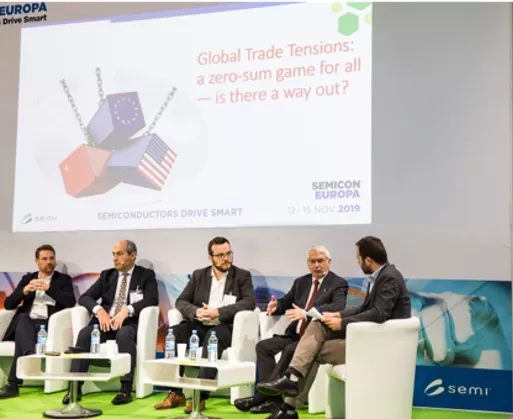
SEMICON Europa panel on Global Trade Tensions: a zero-sum game for all – is there a way out? L-R: Olivier Coulon, Associate, DECISION Etudes & Conseil; Laith Altimime, President, SEMI Europe; Jan-Peter Kleinhans, Project Director, ICT Supply Chain Security & Geopolitics, Stiftung Neue Verantwortung; Malcom Penn, Chairman & CEO, Future Horizons; Emir Demircan, Director of Public Policy, SEMI Europe
More broadly, the panelists stressed that the ubiquity of semiconductors in electronic goods raises the stakes when governments seek to remedy trade differences through the imposition of tariffs. Instead, trade talks should follow a measured approach that balances a complex of technological, geopolitical, economic and business issues to sustain innovation, preserve industry growth and maintain free and fair global trade in commercial semiconductors and related technology. For its part, SEMI has long advocated the power of free and fair trade and, through its 10 Principles for the Global Semiconductor Supply Chain in Modern Trade Agreement, urges governments worldwide to maintain high standards in trade agreements.
The panelists agreed that, in Europe, the new Commission should implement policies that encourage domestic semiconductor R&D, grow the region’s design and manufacturing capabilities and promote Europe’s collaboration with players around the world.
Raising industry awareness of public-private partnerships – MADEin4 ECSEL JU Project
The SEMICON Europa MADEin4 session sought to raise industry awareness of novel approaches to metrology for Industry 4.0, electronics design, and productivity-enhancing platforms. The session was presented by Applied Materials, Thermo Fisher Scientific, Mentor, a Siemens business, and TowerJazz.
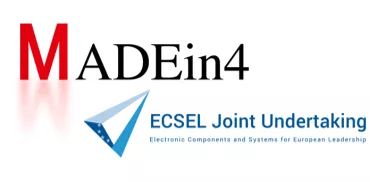 ECSEL JU funds development and innovation projects to buttress Europe’s world-class expertise and leadership in developing technologies that help fuel the digital economy. Through ECSEL JU, 30 participating States and the European Union co-finance development initiatives for the European semiconductor industry including small and midsize enterprises and RTOs. Co-funded by the ECSEL JU Program, MADEin4 develops next-generation metrology tools, machine learning methods and Industry 4.0 applications to advance semiconductor manufacturing.
ECSEL JU funds development and innovation projects to buttress Europe’s world-class expertise and leadership in developing technologies that help fuel the digital economy. Through ECSEL JU, 30 participating States and the European Union co-finance development initiatives for the European semiconductor industry including small and midsize enterprises and RTOs. Co-funded by the ECSEL JU Program, MADEin4 develops next-generation metrology tools, machine learning methods and Industry 4.0 applications to advance semiconductor manufacturing.
MADEin4 – Metrology Advances for Digitized ECS Industry 4.0 – is a consortium of 47 partners from 10 countries connecting the entire supply chain from semiconductor manufacturing to applications including automotive. The project focuses on developing advanced and highly connected cyber physical systems using a novel Industry 4.0 methodology that combines metrology data analysis and design with machine learning and digital twinning.

SEMICON Europa 2019 highlighted how SEMI continues to strengthen its voice to serve the end-to-end semiconductor industry and represent the collective interests of members on a variety of public policy issues including trade, sustainability, talent, technology and R&D funding.
Emir Demircan is director of Public Policy at SEMI Europe. Contact Emir at edemircan@semi.org.